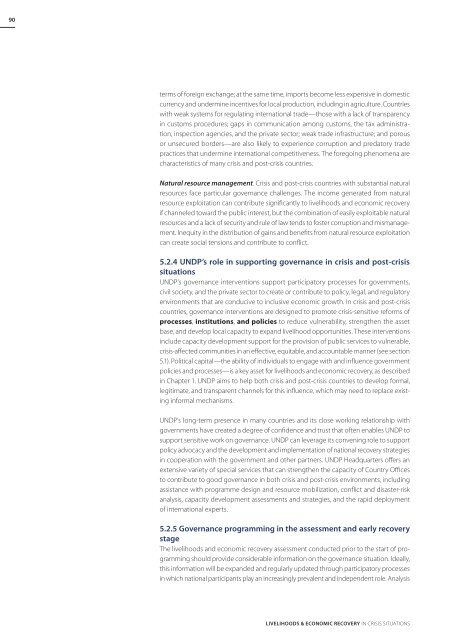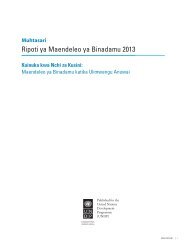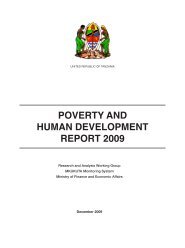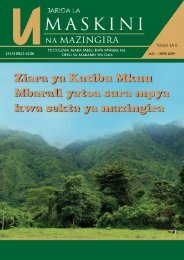Download PDF (4.08 MB) - ReliefWeb
Download PDF (4.08 MB) - ReliefWeb
Download PDF (4.08 MB) - ReliefWeb
You also want an ePaper? Increase the reach of your titles
YUMPU automatically turns print PDFs into web optimized ePapers that Google loves.
90<br />
terms of foreign exchange; at the same time, imports become less expensive in domestic<br />
currency and undermine incentives for local production, including in agriculture. Countries<br />
with weak systems for regulating international trade—those with a lack of transparency<br />
in customs procedures; gaps in communication among customs, the tax administration,<br />
inspection agencies, and the private sector; weak trade infrastructure; and porous<br />
or unsecured borders—are also likely to experience corruption and predatory trade<br />
practices that undermine international competitiveness. The foregoing phenomena are<br />
characteristics of many crisis and post-crisis countries.<br />
Natural resource management. Crisis and post-crisis countries with substantial natural<br />
resources face particular governance challenges. The income generated from natural<br />
resource exploitation can contribute significantly to livelihoods and economic recovery<br />
if channeled toward the public interest, but the combination of easily exploitable natural<br />
resources and a lack of security and rule of law tends to foster corruption and mismanagement.<br />
Inequity in the distribution of gains and benefits from natural resource exploitation<br />
can create social tensions and contribute to conflict.<br />
5.2.4 UNDP’s role in supporting governance in crisis and post-crisis<br />
situations<br />
UNDP’s governance interventions support participatory processes for governments,<br />
civil society, and the private sector to create or contribute to policy, legal, and regulatory<br />
environments that are conducive to inclusive economic growth. In crisis and post-crisis<br />
countries, governance interventions are designed to promote crisis-sensitive reforms of<br />
processes, institutions, and policies to reduce vulnerability, strengthen the asset<br />
base, and develop local capacity to expand livelihood opportunities. These interventions<br />
include capacity development support for the provision of public services to vulnerable,<br />
crisis-affected communities in an effective, equitable, and accountable manner (see section<br />
5.1). Political capital—the ability of individuals to engage with and influence government<br />
policies and processes—is a key asset for livelihoods and economic recovery, as described<br />
in Chapter 1. UNDP aims to help both crisis and post-crisis countries to develop formal,<br />
legitimate, and transparent channels for this influence, which may need to replace existing<br />
informal mechanisms.<br />
UNDP’s long-term presence in many countries and its close working relationship with<br />
governments have created a degree of confidence and trust that often enables UNDP to<br />
support sensitive work on governance. UNDP can leverage its convening role to support<br />
policy advocacy and the development and implementation of national recovery strategies<br />
in cooperation with the government and other partners. UNDP Headquarters offers an<br />
extensive variety of special services that can strengthen the capacity of Country Offices<br />
to contribute to good governance in both crisis and post-crisis environments, including<br />
assistance with programme design and resource mobilization, conflict and disaster-risk<br />
analysis, capacity development assessments and strategies, and the rapid deployment<br />
of international experts.<br />
5.2.5 Governance programming in the assessment and early recovery<br />
stage<br />
The livelihoods and economic recovery assessment conducted prior to the start of programming<br />
should provide considerable information on the governance situation. Ideally,<br />
this information will be expanded and regularly updated through participatory processes<br />
in which national participants play an increasingly prevalent and independent role. Analysis<br />
Livelihoods & Economic Recovery in Crisis Situations





